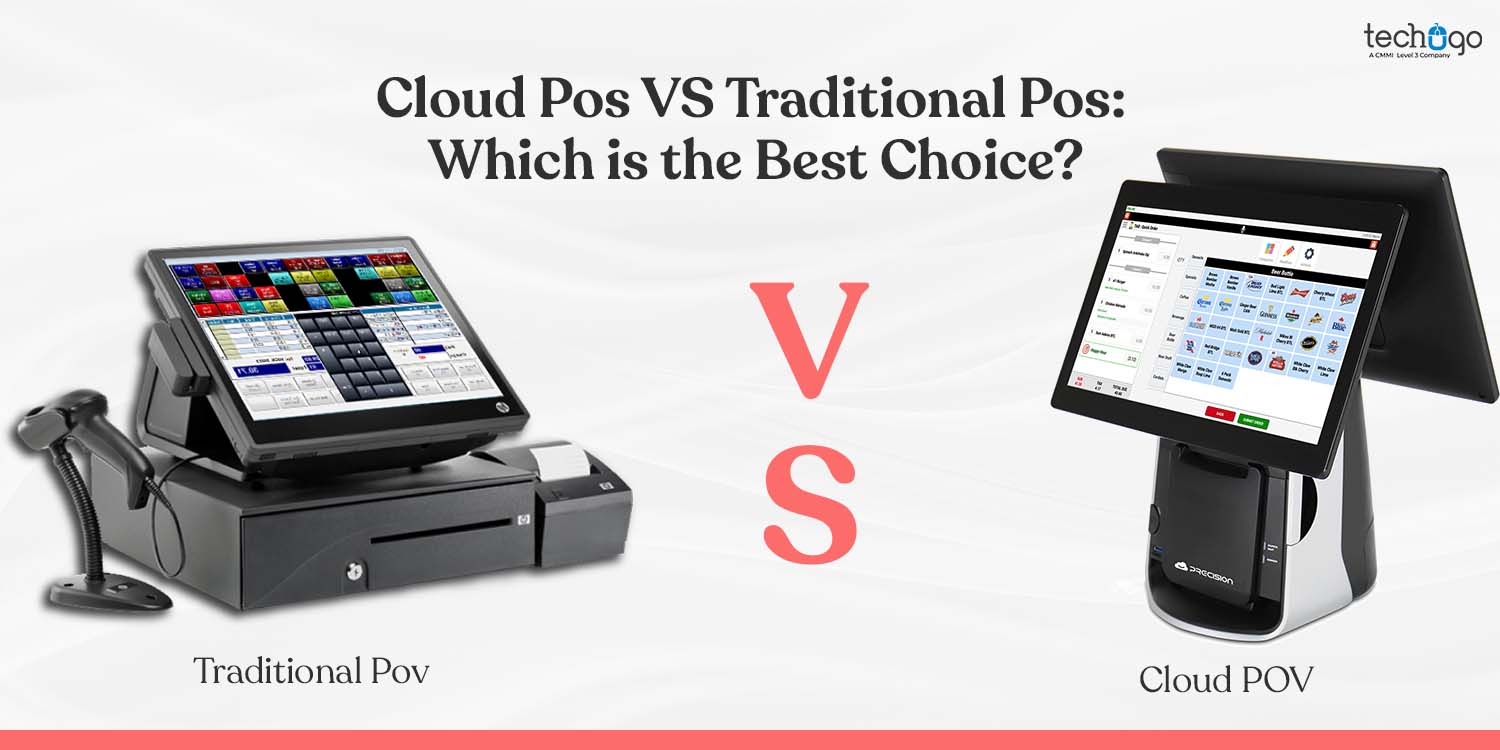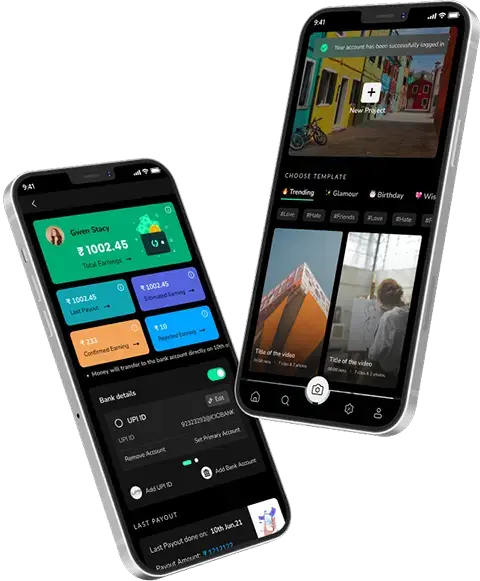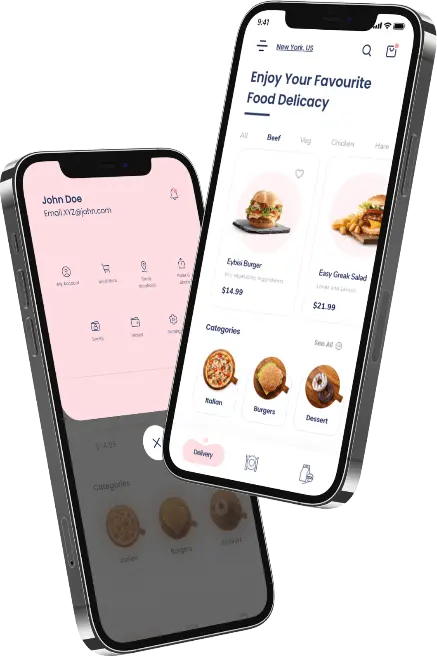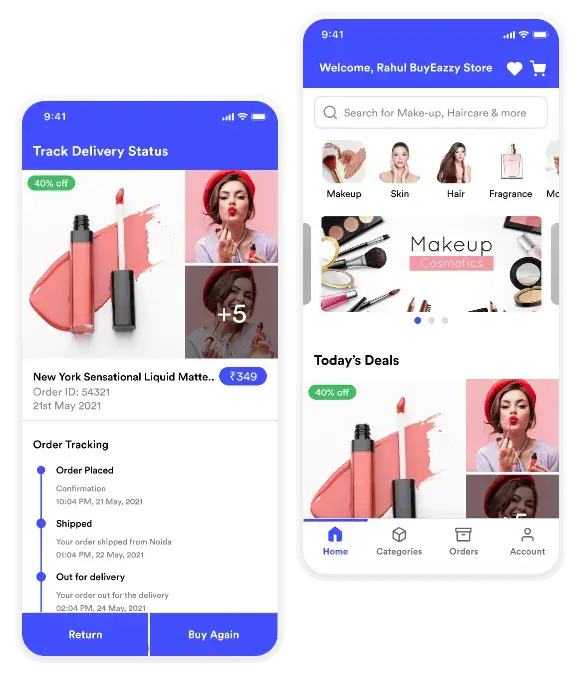22 Feb 2023
Cloud Pos VS Traditional Pos: Which is the Best Choice?
Surbhi Bhatia

All businesses share the same goal: To minimize costs and maximize profits. Therefore, running a business requires you to make crucial decisions every day. For example, you select the best Point of Sale (POS) system for your business.
In its simplest form, a POS system is a vital tool that allows merchants to manage inventory, customer base, invoices, and transactions.
A traditional POS will meet your requirements, or will a cloud POS be more suitable?
Let’s look at some of the differences between cloud pos and traditional pos to understand better.
What is cloud point-of-sale?
Cloud-based POS software typically consists of hardware devices such as cash registers and barcode scanners connected to a central server via the Internet. The server is located in a remote data center rather than on-site.
The data from a sales transaction is transmitted in real-time from the hardware devices to a server. There it is stored and processed. This allows the system to offer various features such as inventory management, customer relationships management, and sales reporting.
What is a traditional POS?
Traditional POS systems are physical systems that are installed at a business. This means that hardware and software are not accessed through the cloud but are managed by the industry.
Even a simple cash register can be considered a legacy point-of-sale system. This simplified version of the point–of–sale system was a great management tool twenty years ago.
Also Read – Pharmacy Point of Sale Software: How to Develop a Pharmacy POS System?
Cloud based POS vs. Traditional POS – What’s the Difference?
Cloud based POS systems allow you to save and store data online. This web-hosted tool stores and protects a server’s information, making it easily accessible from any location.
Traditional POS systems, such as legacy POS, run on closed networks where data is stored on local servers. It can keep cash, print receipts, and dispense cash to customers.
What are the benefits of Cloud POS?
Cloud POS has many benefits for small and medium-sized businesses, including:
- Remote access – This benefit is the greatest of a Cloud POS.You can conduct business operations from anywhere.
- Cloud POS consists of a real-time sync feature. This feature allows you to update data automatically and quickly. This feature is helpful for retailers that use different sales channels.
- Cloud POS provides data security. All your data is backed up online, and it stays there securely. All your data is protected online, so you don’t have to worry about losing it. You don’t have to worry if your device is lost, damaged, or attacked by hackers.
- Scalability. Every business owner wants one thing. To ensure continuous business expansion and growth. Your POS system must be able to scale to your business’s needs. Cloud POS has built-in scalability. It is also easy to scale up with little time, effort, or money.
- Cloud POS provides business insights. It allows you to track all transactions and view the information from anywhere. These insights will help you make informed business decisions.
- Cloud POS is cost-efficient .There are no hardware requirements. This will lower the cost of hardware you need to install On-Premise POS.
- Cloud POS does not require software updates. Ideally, Cloud POS doesn’t require you to spend time updating to the latest version. Cloud POS keeps you up-to-date!
- Improved Performance – App performance and responsiveness will improve as technology is updated. All information is stored on the cloud.
Also Read – App testing elevates performance and triggers growth
What are the cons of Cloud POS?
Cloud POS offers many advantages, but it also has its drawbacks, such as:
- SaaS does not allow for personalization. This is due to the limitations of the model. Small and medium retailers may not find this a problem as they need more time or money to personalize their POS colors or look. However, larger retailers might prefer easily customizable tech to fit their brand and requirements.
- Cloud POS relies on stable internet connections. An unstable internet connection can cause service disruptions. With the Internet, your Cloud based POS system can be accessed. There are very few cloud-POS providers that offer offline support.
What are the benefits of Traditional POS?
There are some advantages to having a POS installed on your premises.
- Independence from the Internet – Traditional POS is independent of the Internet. You can access the system from anywhere, even if you don’t have an internet connection.
- Low operating costs – On-premise POS typically has one-time fees followed by maintenance. The entire system was designed specifically for your business. You only need to pay one time for implementation, and the whole system becomes your asset.
- Extensive display setup – Choosing a traditional POS system is like buying furniture. With large screens, the On-premise POS can be bulky. The On-Premise POS is stable and straightforward, depending on your needs. This makes On-Premise POS a popular choice for coffee shops, fine-dining restaurants, fast-food chains, and retail stores.
What are the drawbacks of Traditional Point-of-Sale (POS)?
Consider traditional POS’s limitations before making a decision.
- Traditional POS requires a higher capital investment. You will need to arrange for the system required with On-premise POS. You will need additional hardware to make the POS work, which can lead to higher prices.
- Accessing data while on the move is impossible – Traditional POS relies on something other than the Internet. You cannot access it from anywhere. You must be at the terminal if you need to make any transactions.
- Physical space is a problem – On-premise POS requires a lot of physical space. If you have a small office, this could not be easy.
What are the Different Types of POS Systems?
Point of Sale Systems allows companies to manage and monitor their sales. There are three main types of point-of-sale systems:
- Traditional Point of Sale Systems are the most popular type of Point of Sale system. These systems are used in restaurants and retail shops to keep track of sales and collect money.
- Mobile Point of Sales Systems: They are trendy in retail stores. However, they can also be used for other types of businesses, such as food trucks and construction companies.
- Cloud-based POS Systems: These POS systems connect to your company’s back-end system via the Internet. This makes it easier to view your data from any location with an internet connection.
Direct Comparison of Cloud-Based and Traditional POS
- Traditional POS: Software and hardware are usually paid upfront. However, some providers offer a monthly option for software. You can choose hardware, software, and payment processing services to create a customized solution. Software and hardware upgrades are an additional investment.
- Cloud POS: The hardware is usually paid upfront, while the software is paid monthly via a subscription. The software can be accessed from any mobile device. Your monthly subscription fee usually includes updates.
Software
Software updates in traditional POS systems can be slower and more complex. This is why it’s essential to have the assistance of your vendor.
- Traditional POS is not dependent on the Internet, which means you can access your data offline. You can still sell using a local point-of-sale solution even if your Internet is down.
Another advantage is that traditional POS software is usually a one-time expense.
- Cloud POS requires an internet connection, but the software can be updated quickly. To avoid interruptions in business, your provider will install updates remotely and automatically, often overnight.
Cloud based POS software is usually available with a monthly subscription fee. This is in contrast to the one-time price of traditional POS software.
Hardware
- Traditional POS systems need a back office computer, terminals, and a setup around the store. (Or just one if it’s a small store). A dedicated touchscreen monitor and an on-site server are required for the till.
Depending on your business, you will likely need a pin pad and cash register.
- Cloud POS requires the same hardware as above but can be accessed from a mobile device.
Data storage
The retail industry is having a heated debate about the cloud. While many believe data in the cloud is less secure than in one location, others trust the cloud for business and personal use.
- Traditional POS stores data locally and has a closed network that protects against hackers. To safeguard business data, IT vendors employ industry-standard security protocols.
If your data isn’t backed up, it could be lost forever if a virus or an unexpected event attacks your system.
- Cloud based POS system store data remotely on remote servers. As a result, you have backups of your data and are usually unaffected by any physical damage. It is also much easier to update data in real-time and automatically. Cyber attacks can be a problem, but security measures are usually strong enough to protect you.
Maintenance
Traditional POS maintenance involves technicians visiting your location to perform upgrades or provide remote support. As a result, there are always risks of business interruptions. However, if there are problems, it is possible to fix them immediately.
Cloud POS maintenance can be done online, and automatic updates to the software are provided. Therefore, your system will be compliant and secure with real-time updates. However, if your Internet is down for any reason, you may miss or disrupt updates. You will need to contact your provider to resolve any issues.
Which is better for small businesses – cloud-based POS or traditional POS?
Traditional POS systems can be expensive to set up and maintain. They also require a cash register, or tablet, per register. Software installation, updates, maintenance, and possible downtime are part of the process. This is why 58% of small businesses still need a POS.
The cloud-based POS, on the other hand, is a newer technology. It has not been tried for as long as the traditional post. The cloud-based POS system is less expensive than conventional POS due to its lower hardware costs. Because they don’t require IT support personnel on-site, this POS system is also cheaper to maintain.
They can also be accessed via any internet-connected device. In addition, employees can access the data and make transactions from their devices.
Cloud-based POS systems are more efficient than traditional POS systems. Accessibility options are available from any mobile device and your computer anywhere in the world. It integrates seamlessly with existing business data and workflows and gives you an intuitive, comprehensive interface for your business needs.
Questions to ask yourself before you choose a POS Technology
You may be a retail shop owner and are now considering implementing a reliable POS system online. Is this the right decision? Each business is different, and each has its own set of suitability issues you must consider when integrating any new system. Before implementing a POS system that suits your business, it is essential to ask these questions. This will allow you to select the best POS technology for your business.
- Which type of business are you operating?
- How much do you have to spend?
- How many employees does your company have?
- Are you looking to integrate with other systems and mobile applications?
- Are you looking for a mobile solution to your problems?
- Do you need a particular brand, type of hardware, or software for the POS market?
These questions help you choose the most suitable POS system for your business. Ask them questions, and you can make the best decision about cloud-based or traditional POS.
Cloud-based POS technology is still relatively new in the market. However, its simplicity, affordability, and ability across multiple devices make it a better choice than the traditional POS system. This makes it an attractive option for small businesses looking for a cost-effective, user-friendly solution.
A new POS system must seamlessly integrate with your new retail model. Switch to the cloud, and you can try a cloud-based POS system. This will help you save money while improving the service you provide to your customers.
Techugo’s POS System: Adopt and Implement Today
Have you found the right cloud based POS solutions?
Cloud-based POS solutions are more attractive than traditional POS, although they do not have any bias.
We are proud to be one of the first to use cloud tech and recommend that you hire professionals to design your POS solutions. Softwares such as POS are highly secure. Cloud based POS solutions offer significant advantages in today’s digital business landscape. Not to mention the potential benefits of future-proofing your company. Traditional POS solutions are faster and more secure.
Innovative solutions can bridge this gap and offer the best of both the online and offline worlds.
Owners can make an informed decision about their business goals by understanding the differences and how they might work together.
Did you enjoy this article? Share this article.
Get in touch with us to know more.
Get in touch.
Write Us
sales@techugo.comOr fill this form



 SA
SA  KW
KW  IE
IE AU
AU UAE
UAE UK
UK USA
USA  CA
CA DE
DE  QA
QA ZA
ZA  BH
BH NL
NL  MU
MU FR
FR 













